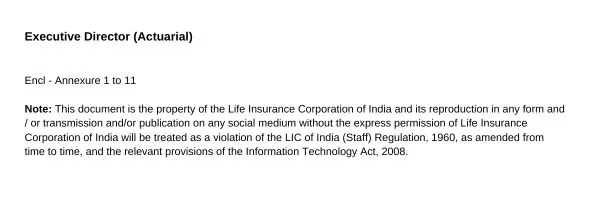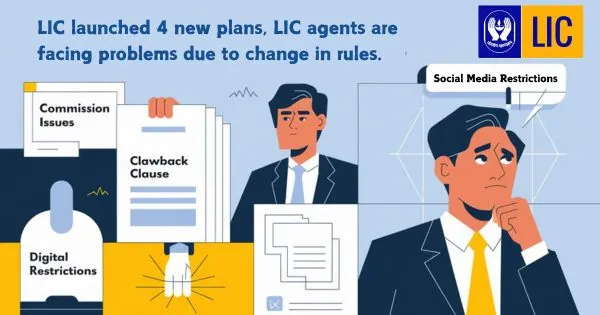Life Insurance Corporation (LIC) of India, one of the most trusted names in the Indian insurance sector, has recently introduced a set of new plans and modifications to existing policies. While these developments aim to offer more tailored solutions for policyholders, they have also sparked significant concerns among LIC agents. Issues such as reduced commission rates, the implementation of a controversial clawback clause, increased premiums, restricted age brackets, and digital media restrictions have added complexities to agents’ roles.
This article delves into the intricacies of these newly launched and modified LIC plans, examines the challenges faced by LIC agents, and highlights the disconnect between LIC management and its agents. As LIC undergoes changes to adapt to market demands, it faces an urgent need to address the growing concerns within its agent community—a critical group that plays a pivotal role in its success.
Also see: LIC New Jeevan Shanti Plan 758
Newly Launched and Modified Plans
On November 14, 2024, LIC unveiled 4 newly launched plans alongside modifications to four existing ones, in alignment with the IID rule changes. These new offerings include the following:
- Yuva Term Plan (Plan No. 875)
- Jeevan Amar (Plan No. 955)
- Money Back Plan (Plan No. 720)
- Jeevan Tarun Plan (Plan No. 734)
The modifications have enhanced the structure, features, underwriting processes, and surrender and free-look clauses of each plan. According to LIC, the goal is to provide updated, customer-centric solutions that align with current market demands. However, these changes have also raised concerns among LIC agents, who are calling for clarity on how these plans affect their commission structures and other rights.
Major Issues Faced by LIC Agents
1. Reduced Commission Rates
Commission rates for LIC agents have reportedly been reduced, affecting their income. LIC agents play a crucial role as the face of the corporation, directly connecting customers to LIC products. The recent commission cuts have left agents concerned about their financial stability. LIC Chairman had previously assured agents that these cuts would not severely impact them, yet the actual implementation has led to widespread dissatisfaction.
2. Increased Premiums
Another pressing concern for agents is the increase in premium rates. As premiums rise, policies become more challenging to sell, especially in an increasingly competitive insurance market. Many customers have voiced their grievances over these price hikes, which, in turn, affects the agents who rely on commissions from policy sales. As premium rates increase, agents find it more difficult to convince prospective policyholders, impacting their ability to achieve sales targets.
3. Clawback Clause Implementation
The clawback clause has emerged as one of the most controversial topics among LIC agents. This clause allows LIC to reclaim a portion of commissions if policyholders surrender their policies within a certain timeframe. Although LIC’s chairman had previously reassured agents that the clawback clause would not be implemented, the mention of this clause in recent documentation has created confusion. Agents have raised concerns, arguing that the clawback clause jeopardizes their earnings, as they have limited control over policyholder decisions to maintain or surrender policies.
Also see: LIC Bima Shree Plan 748
4. Restricted Age Brackets
The age bracket for policyholders has also been reduced significantly, limiting the eligibility range for many LIC plans. Agents argue that a reduced age bracket restricts their potential market, making it more challenging to find eligible customers, particularly for age-sensitive policies. This change has limited the ability of agents to serve a broad demographic range, especially those in older age groups seeking specific coverage options.
5. Digital and Social Media Restrictions

LIC recently issued a directive prohibiting the publication, sharing, or transmission of its documents on social media or public platforms. This restriction, communicated via a note from LIC’s Executive Director, warns agents against using digital platforms to disseminate information. This decision conflicts with LIC’s ongoing digital transformation initiatives and has led to frustration among agents, who rely on social media to educate clients and share policy information.
The restriction limits LIC agents’ ability to reach prospective clients and effectively communicate plan details. In today’s digital era, where platforms like WhatsApp and YouTube serve as essential communication tools, LIC’s decision to impose digital restrictions has perplexed agents. They argue that this move limits their reach and curtails their ability to inform clients effectively, which ultimately affects their sales.
Also see: LIC Jeevan Utsav Plan 771
The Growing Disconnect Between LIC and Its Agents
The relationship between LIC management and its agents has shown signs of strain. Many agent associations, previously vocal about agents’ rights, are reportedly under pressure from LIC to avoid discussing sensitive issues publicly. Social media has seen fewer updates on agent-related grievances, as many platforms that once allowed open discussions have now limited content related to LIC’s policies. Agents feel that this suppression of information hinders their ability to express their concerns and, more importantly, restricts the flow of essential information about new policies and updates.
Revised Plan Structures and Implications for Agents
Each of the newly launched and modified plans has unique selling points and commission structures that vary from previous policies. Although LIC has provided detailed documents for each plan, including information on underwriting processes, unique selling propositions (USPs), and commission structures, many agents argue that the changes in commission rates and clawback provisions make it challenging for them to adapt to the new structure.
Agents are expected to stay informed about the specifics of these new policies, yet they face limitations due to LIC’s social media restrictions. This communication barrier further complicates agents’ ability to educate themselves and their clients about the new policy nuances, ultimately impacting their sales performance.
The Impact of Clawback on Agents’ Earnings
The inclusion of clawback provisions in LIC’s new policy documentation is particularly concerning for agents, as it implies a risk to their earnings from surrendered policies. Despite verbal assurances that clawback would not be implemented, the continued mention of this clause leaves agents in a state of uncertainty. The risk that commissions may be reclaimed if policyholders exit prematurely puts added financial pressure on agents, who argue that such risks should not be their responsibility.
The clawback clause is a contentious issue because it introduces financial unpredictability, making it harder for agents to rely on their income from policy sales. In response, agents are seeking written guarantees that the clawback provision will be removed entirely, or at least modified to minimize its impact on their livelihoods.
Call for Improved Communication and Transparency
LIC agents are advocating for greater transparency and communication from LIC regarding policy updates, commission structures, and the rationale behind premium increases. They are requesting written documentation to clarify the status of clawback provisions and assurance that they will not face punitive actions for policy lapses outside of their control.
Agents also seek greater freedom to use digital platforms for educational and promotional purposes. In the age of digital marketing, agents argue that the restrictions LIC has imposed on social media usage are counterproductive. They believe LIC should empower its agents by equipping them with digital tools and training to reach a wider audience, especially given LIC’s stated commitment to digital innovation.
Conclusion
The recent introduction of new and modified plans by LIC reflects an effort to remain competitive in a changing insurance landscape. However, the issues of reduced commission rates, increased premiums, clawback clauses, restricted age brackets, and digital restrictions create significant challenges for LIC agents. These issues underscore the need for LIC to re-evaluate its approach to supporting its agents, who remain critical to the corporation’s success.
To foster a productive partnership with its agents, LIC should prioritize clear communication, provide written assurances regarding commission structures, reconsider restrictive digital policies, and offer comprehensive training on its updated plans. As the insurance industry becomes increasingly digital, LIC’s agents need tools that empower them rather than restrict them. Ultimately, LIC’s success hinges on the satisfaction and efficacy of its agents, who are essential in bridging the gap between the corporation and its policyholders.
FAQs
What are the newly launched plans by LIC as of November 14, 2024?
LIC recently introduced four new plans, including the Yuva Term Plan (Plan No. 875), Jeevan Amar (Plan No. 955), Money Back Plan (Plan No. 720), and Jeevan Tarun Plan (Plan No. 734). These plans are designed to offer modified features and updated structures in line with the current insurance regulations.
How have the commission rates for LIC agents changed?
LIC agents have reported reduced commission rates, which impacts their income. Although the LIC chairman had previously reassured agents, the recent documentation has confirmed the reduction, causing concerns among agents about their long-term financial stability.
What is the clawback clause, and why is it a concern for LIC agents?
The clawback clause allows LIC to reclaim part of the commission if policyholders surrender their policies within a certain timeframe. Despite assurances that this clause would not be enforced, recent plan documentation has mentioned it, leading agents to worry about its potential impact on their earnings.
Why has LIC restricted agents from sharing information on social media?
LIC issued a directive prohibiting agents from sharing official documents on social media without permission, citing internal policy and legal regulations. This restriction limits agents’ ability to communicate policy details digitally, which they argue hampers their outreach to potential clients in a digital-first era.
How are LIC agents advocating for their rights and better support from LIC?
LIC agents are calling for greater transparency, written guarantees on commission policies, and permission to use social media for client education. They believe these changes are essential for their success, particularly as the insurance market becomes more competitive and digitally driven.
Disclaimer: This article is based on information from LIC’s recent communications and available resources. It aims to provide an overview of current LIC plans and agent-related issues for informational purposes only. Readers should consult LIC or official LIC documentation for detailed policy information, as regulations and terms may vary. This article does not serve as financial or legal advice.
